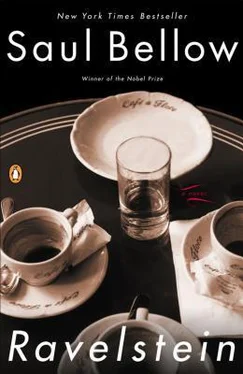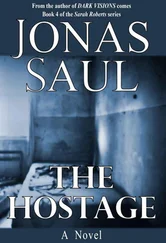Rakhmiel was anything but simpleminded. My belief is that on the side he grew a little herb garden of good, generous feelings. He hoped, especially when he was wooing a new friend, that he could pass for a very decent man. He was also very learned. When you first came into his apartment your respect for him grew. On his shelves there were full sets of Max Weber and all the Gumplowitches and Ratzenhofers. He owned the collected works of Henry James and of Dickens and the histories of Gibbon's Rome and Hume's England as well as encyclopedias of religion and masses of sociology books. Useful for propping up windows when the sash cord broke, I used to say. There was also the green ink. No other color was used. The green was his exclusive trademark.
Ravelstein shouted with laughter when we came to this. He said, "That's how I want to be treated, too. That's it. I want you to show me as you see me, without softeners or sweeteners."
Ravelstein, after he had read my sketch of Kogon, said that should have commented on his sex life-a major omission, he believed. He told me authoritatively, "You've missed it-Kogon is attracted to men." When I asked for some proof of this he said that So-and-so, a graduate student, swore up and down that one night when they had drunk too much, Rakhmiel tried to kiss him. It was hard to think of Kogon as a kisser and I said that never in a thousand years could I picture Rakhmiel forcing his way on someone. "Then you've been brainwashed," said Ravelstein. Nothing in this line was too improbable for him, but I failed in every attempt to visualize Rakhmiel kissing anyone. I couldn't even picture him kissing his old mother. He would shout at her without mercy and then he would say, "She's deaf…." But I don't believe she was at all deaf, his bewildered mama.
Back from the hospital, Ravelstein was doing reasonably well. Of course he couldn't beat his infection but he said, "I'm in no hurry to die." His social life flourished. In his best days he flew like a hawk, as he himself said. "But now I flutter like those wild turkeys on your place in New Hampshire."
He could walk well enough, though his sense of balance was off.
He could also dress and feed himself, shave, brush his teeth (he wore an upper plate), tie his shoes, and run the steam-fizzing espresso machine-too big for the grooved enamel of the kitchen sink. His hands shook hardest when there was an extra-delicate operation to perform, like finding an eyehole with the tip of the shoelace. He was barely strong enough to wear his general-staff fur-lined suede coat that dragged on the ground when I helped him put it on. He could no longer reset his watch and had to ask Nikki or me to do it.
He was, however, still giving parties on nights when his team the Bulls were on TV. And now and then he took his student favorites to a dinner party at Acropolis on Halsted Street. The waiters there gave him power handshakes and called out, "Hey, lookit, the Professor!" They urged him to drink olive oil neat, by the glass. "Too late to save your hair, Prof, but still the best medicine."
We went also to a dining club downtown: Les Atouts-the Trump Cards. There Abe had a longtime gentlemanly connection with M. Kurbanski-accent on the ban. M. Kurbanski, the Serbian owner-manager, went abroad several times a year. He was preparing to retire to a villa on the Dalmatian coast.
He had a fine full front-head and belly matching a very impressive wide, short-nosed, breath-held pale face. His hair was combed straight back. He wore a cutaway coat. Altogether he gave Ravelstein the pleasure of feeling that he was dealing with a civilized man.
Ravelstein would say to me, "What's your take on Kurbanski?"
"Well, he's a Franco-Serbian gentleman who offers local people membership in his dining club east of Michigan Boulevard."
"What kind of war record has he got?"
"He says he fought the Germans. He belonged to the Maquis."
"They'd all tell you that. But I don't think he was a Communist," said Ravelstein. "To hear them describe it, they were all freedom fighters on the mountaintops. What's your bottom-dollar hunch about Kurbanski?"
"If he were up against it he could put a bullet through his head," I said. "That's more like it. I agree with you. But under it all he's a superior mвitre d'," said Ravelstein. "Who's going to dispute him if he claims he was a guerrilla in his glory days and fought the Germans?"
"That's why he wears such a sad and distant look. So what's left?" Ravelstein said. "The Jewish question."
"Not to be a Jew was very desirable in those times, a big asset. One never knows. But the big thing with Kurbanski is being French."
"Yes. We come into his establishment and he chats us up in French. And this courtesy is possible, though we are Jews, because we can answer in acceptable French…."
"I like to hear you when you're drunk, Chick, talking and sketching freestyle. You're right to insist that Kurbanski has a sad look…."
Ravelstein had come to agree that it was important to note how people looked. Their ideas are not enough-their theoretical convictions and political views. If you don't take into account their haircuts, the hang of their pants, their taste in skirts and blouses, their style of driving a car or eating a dinner, your knowledge is in complete.
"One of your best pieces, Chick, is the one about Khrushchev at the UN pulling off his shoe and banging it on the table. And almost as good is your sketch of Bobby Kennedy, when he was the Senator from New York. He took you along on his Washington rounds, didn't he?"
"Yes. For one whole week…"
"Now that was one of your sketches that held my interest," said Ravelstein. "That his Senate office was like a shrine to his brother-a huge painting of Jack on the wall. And there was something savage about his mourning…."
"Vengeful, was what I said."
"Lyndon Johnson was the enemy, wasn't he. They had gotten rid of him by making him vice president-a kind of errand boy. But then he was Jack's successor. And Bobby needed arms to retake the White House. Full of hate. They were very handsome men, both brothers. Bob was half the size of Jack," Ravelstein said, "but an alley fighter. Most amusing of all were those walks from the Senate office building to the Capitol. Those were wonderful questions he asked you-like, 'Tell me about Henry Adams.'
'Brief me on H. L. Mencken.' If he was going to be President, he thought he should know about Mencken."
It thrilled Ravelstein to talk about celebrities. At Idlewild, once, he had spotted Elizabeth Taylor and for the better part of an hour tracked her through the crowds. It especially pleased him to have recognized her. Because she was so faded, it took some doing. She seemed to know that her glamour was gone.
"You didn't try to talk to her?"
"Uh-uhn."
"As a best-selling author you were on equal footing with other celebrities." But no. He and I were sitting, as we had sat for years, in his living room, and he was in his Japanese gown. It fell away from his body on all sides. His bare legs were like prize-winning marrows because his ankles were so swollen-"That fucking edema!" he said. The top half of Ravelstein was as lively as ever. But the disease was gaining on him, and he knew it as well as any doctor. Not only did he talk more about the memoir I was appointed to write but he had curious things to tell me. About the persistence of sexual feelings, for instance. "I've never gotten so hot," he said. "And it's too late in the day for partners. I have to ease myself…."
"What do you do?"
"A hand-job. What else is there? At this stage, I'm humanly out of the running." The thought of it made me flinch. "I'm fatally polluted. I think a lot about those pretty boys in Paris. If they catch the disease they often go back to their mothers, who care for them. My old lady is a poor thing, now. Last time I saw her I asked, 'Do you know me?' and she said, 'Of course. You're the fellow who wrote that famous best-seller everybody talks about.'"
Читать дальше












